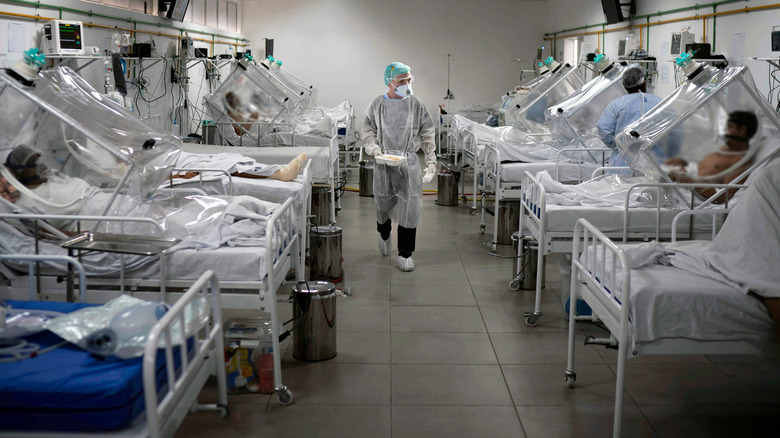Why Hospitals In These States Are Struggling The Most Amid The Omicron Surge
As the spread of the highly transmissible Omicron variant continues to impact the country at large, many states are facing challenges in providing care to hospital patients. As of January 12th, COVID-19 hospitalizations have climbed to a record total of 151,261 cases nationally (via CNN). Such numbers reflect health experts' cautions of a winter surge, which has continued to impact businesses, schools, and travel as we enter 2022 (via The New York Times).
In addition to the challenges of increased patient numbers, health care facilities are also experiencing shortages in available staffing due to quarantine requirements for health care workers who test positive for the virus (via CNN). In response to these shortages, government officials are sending federal emergency teams to assist in providing care in states whose hospital ICUs are reaching near capacity for occupancy.
Director of global health in emergency medicine at New York-Presbyterian/Columbia University Medical Center Dr. Craig Spencer tells CNN how medical staffing shortages are affecting the needs of all patients. "The problem is that right now we have hospitals where there's not enough nurses to take care of the patients who are coming in, the Covid patients and the non-Covid patients."
These are the states nearing ICU capacity
Nearly 20 states are now down to 15% remaining intensive care unit (ICU) capacity (via CNN). Among them, Kentucky, Alabama, Indiana, and New Hampshire are at less than 10%, as reported by the U.S. Department of Health and Human Services.
Additionally, Connecticut and Maryland report that occupancy rates of ICU beds have surpassed 80%, with one ICU hospital facility in Meriden, Connecticut reporting being completely full (via NBC News). In an email to NBC News, the president of the facility explained what's been driving the surge: "The surge is real. What's also causing our volume to increase so dramatically is that during the first wave, people with other medical conditions were not going to hospitals for treatment due to the pandemic. Now, all those patients who stayed away the first time, are coming in for treatment — as they should."
In some cases, this influx of patients seeking hospital care for non-COVID-related issues has incidentally increased ICU occupancy, with patients unknowingly testing positive and then having to quarantine (via CNN). In order to assist essential health care workers, Dr. Craig Spencer states, "We need to do what we can to slow that spread right now and ease the pressure on our hospitals."


